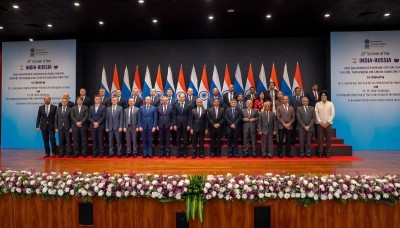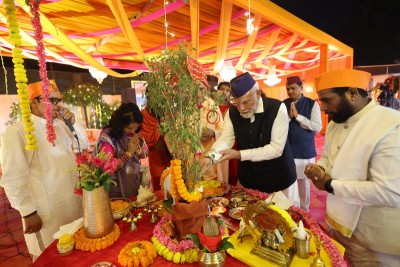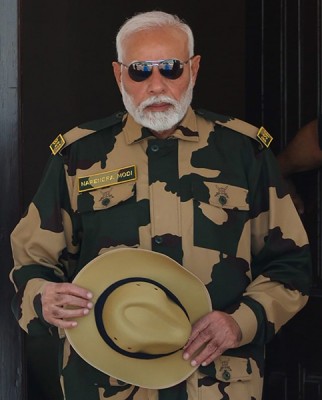
Desperate Measures
On March 30, 2017, parts of seven bodies, including one male, two females and four children, were found scattered by SWAT and Counter Terrorism and Transnational Crime (CTTC) personnel after the conclusion of 'Operation Hit Back' at a Neo-Jama'atul Mujahideen Bangladesh (Neo-JMB) den at Nasirpur village in the Moulvibazar District. Monirul Islam, the CTTC chief stated that the terrorists might have blown themselves up inside the hideout after having failed to flee.
On March 27, 2017, six terrorists, including five males and a female, were killed inside a terror den at Atia Mahal in Sylhet city, in an Army-led operation codenamed 'Operation Twilight'. After the Operation, Brigadier General Fakhrul Ahsan, spokesperson of the operation, at a press conference near Atia Mahal, disclosed that the terrorists were killed when Army personnel fired at them, as their suicidal vests were still on their bodies.
The use of suicide explosions in Bangladesh's intensifying struggle between Government Forces and Islamist extremists started on December 24, 2016, when a teenage boy and a woman had blown themselves up with suicide vests during a Police raid on a Neo-JMB hideout in the capital, Dhaka, to avoid arrest. Indeed, there is increasing evidence of desperation in terrorist actions, as they have been forced on the run by the Police and other Security Forces (SFs) aggressively hunting them down after the Gulshan Cafe attack .
Since the Gulshan Cafe incident on July 1, 2016, according to partial data collected by the South Asia Terrorism Portal (SATP), 78 Islamist terrorists have been killed and another 907 arrested across Bangladesh. Prominent among those killed were the Neo-JMB leader and mastermind of the Gulshan Cafe attack, Tamim Ahmed Chowdhury aka Shaykh Abu Ibrahim Al Hanif aka Amir (30); JMB 'military commander' for the northern region Khaled Hasan aka Badar Mama (30); Neo-JMB 'military commander' Murad aka Jahangir Alam aka Omar; JMB 'regional commander' Tulu Mollah (33); JMB 'regional coordinator' Abu Musa aka Abujar; Neo-JMB 'military chief' Aminur Islam aka Alam (23); and Harkat-ul-Jihad-al Islami Bangladesh (HuJI-B) 'regional commander' Tajul Islam Mahmud aka Mama Hujur (46) (data till April 9, 2017).
Disturbingly, suicide attacks have also intensified in Bangladesh. On March 24, 2017, a suicide bomber blew himself up in front of the Shahjalal International Airport intersection in Dhaka city; on March 18, 2017, a man carrying bombs was killed in Rapid Action Battalion (RAB) firing when he tried to penetrate a RAB check post on a motorcycle in the Khilgaon area of Dhaka city; and on March 17, 2017, a suicide bomber sneaked into a RAB barrack and blew himself up in the Ashkona area of Dhaka city, injuring two RAB personnel.
According to investigators, Lokman Ali aka Sohel Rana (40), the 'chief' of Neo-JMB's Chittagong chapter, who was killed at the Nasirpur hideout in Moulvibazar District, was in charge of recruiting members for Neo-JMB's suicide squads and training them to become suicide bombers. Their training was carried out at a mud house located in the remote and hilly Baishari area of Bandarban District. Sohel convinced one of his associates, Selim, to purchase land in Baishari's Lombabil Khorolia Mora area, where he then set up his operations in a four-room mud house. In Baishari, he identified himself as Mosharraf Hossain, a rubber plantation worker and fabrics trader.
Meanwhile, on March 30, 2017, Police revealed that the Neo-JMB had adopted a new strategy of setting up its hideouts in Hindu-populated neighborhoods across Bangladesh, aiming to deceive law enforcement agencies. According to the Police, Neo-JMB members Kamal and his wife Arjina, who were arrested from a hideout at Sitakunda in Chittagong District on March 16, 2017, confessed that their top leaders were moving into secret hideouts set up in areas where Hindu communities lived. Further, the group's high command has instructed terrorists at each hideout to inflict as much damage as possible in a suicide operation, if they are discovered. Two Neo-JMB hideouts neutralized recently fit this description. At the Atia Mahal den in Sylhet District, of the 28 families in the neighborhood, 20 are Hindu. Similarly, the Sitakunda den was located in a predominantly Hindu neighborhood.
Significantly, M. Moniruzzaman, Assistant Inspector General of Police, Headquarters, observed, on April 8, 2017, that the Government was in the process of banning Neo-JMB following a formal request by the CTTC unit to Home Ministry through Bangladesh Police Headquarters. Currently, seven terrorist groups are banned in the country, including Ansar al-Islam, which was banned on March 5, 2017; Ansarullah Bangla Team (ABT) in 2015; Hijb-ut Tahrir in 2009; and JMB, HuJI-B, Shahadat-e al-Hikma (SAH) and Jagrata Muslim Janata Bangladesh (JMJB) were all banned in 2005. If banned, Neo-JMB would be the eighth such group.
Speaking at a rally on the grounds of the Government Rajendra College in Faridpur District on March 29, 2017, Prime Minister Sheikh Hasina Wajed, urged the people to resist terrorism and extremism: "All will have to resist terrorism and militancy. Be sure that not a single child resorts to terrorism and militancy. The path of terrorism and militancy isn't ours. Islam never permits killing of innocent people and suicide attempts." Further, during a mammoth rally of Islamic religious leaders and scholars in Dhaka city's Suhrawardy Udyan on April 6, 2017, the Prime Minister reiterated "Everybody who believes in peace should be united against terrorism."
Similarly, calling for unity against militancy for the sake of the country, Inspector General of Police (IGP) A.K.M. Shahidul Haque noted, on April 4, 2017, "We should raise our voice against militancy. We should be more aware and responsible against militancy. We are watching every step of terrorists." Separately, Home Minister Asaduzzaman Khan Kamal, talking to journalists at the Mymensingh Police Media Centre on April 5, 2017, asserted that there was no space for terrorists and militancy in the country, and the enforcement agencies could combat terrorists with a strong hand with the help of the people. He added that the Prime Minister had adopted a 'zero tolerance policy' against militancy.
Despite major Government successes against Islamist groups in Bangladesh, a dangerous new phase of Islamist radicalism, marked by a spate of suicide bombings, appears to be crystallizing. Nevertheless, it is now clear that the exaggeratedinternational fears on the entry and proliferation of the Islamic State (IS, also Daesh) into Bangladesh, were misplaced. The threat in Bangladesh remains local and is rooted in the decades of unchecked Islamist radicalization under preceding regimes. Crucially, despite a rash of purportedly Daesh-linked incidents, Dhaka has demonstrated the efficacy of determined and relentless action against terrorist formations. The possibility of occasional incidents - including suicide bombings - cannot be entirely excluded, but recent incidents suggest that terrorist capabilities have been enormously degraded, and the occasional acts of desperation have proven fairly ineffectual, in terms of inflicting casualties and damage. Bangladesh's "war on terror" may not end any time soon, but it has already had enormous impact.
Image: Wikimedia Commons
Support Our Journalism
We cannot do without you.. your contribution supports unbiased journalism
IBNS is not driven by any ism- not wokeism, not racism, not skewed secularism, not hyper right-wing or left liberal ideals, nor by any hardline religious beliefs or hyper nationalism. We want to serve you good old objective news, as they are. We do not judge or preach. We let people decide for themselves. We only try to present factual and well-sourced news.







